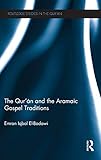The Qur'an and the Aramaic Gospel traditions [Texte imprimé] / Emran El-Badawi
نوع المادة : نصالسلاسل:Routledge studies in the Quran (Routledge, London)تفاصيل النشر:London ; New york : Routledge, 2014وصف:1 vol. (XIX-280 p.) : ill., carte ; 24 cmتدمك:
نصالسلاسل:Routledge studies in the Quran (Routledge, London)تفاصيل النشر:London ; New york : Routledge, 2014وصف:1 vol. (XIX-280 p.) : ill., carte ; 24 cmتدمك:- 978-0-415-82123-0
- 222 23A
- 222
| نوع المادة | المكتبة الحالية | رقم الطلب | رقم النسخة | حالة | تاريخ الإستحقاق | الباركود | |
|---|---|---|---|---|---|---|---|
|
|
Bibliothèque centrale En accès libre | 222 / 1022 (إستعراض الرف(يفتح أدناه)) | 1 | المتاح | 000005534609 |
"This book is a literary and historical analysis of the Arabic Quran and Aramaic Gospels, i.e. the four canonical Gospels preserved in the Syriac and Christian Palestinian Aramaic (CPA) dialects"-- Provided by publisher
"This book is a study of related passages found in the Arabic Qurʼan and the Aramaic Gospels, i.e. the Gospels preserved in the Syriac and Christian Palestinian Aramaic dialects. It builds upon the work of traditional Muslim scholars, including al-Biqa'i (d. ca. 808/1460) and al-Suyuti (d. 911/1505), who wrote books examining connections between the Qur'an on the one hand, and Biblical passages and Aramaic terminology on the other, as well as modern western scholars, including Sidney Griffith who argue that pre-Islamic Arabs accessed the Bible in Aramaic. The Qur'ân and the Aramaic Gospel Traditions examines the history of religious movements in the Middle East from 180-632 CE, explaining Islam as a response to the disunity of the Aramaic speaking churches. It then compares the Arabic text of the Qur'ân and the Aramaic text of the Gospels under four main themes: the prophets; the clergy; the divine; and the apocalypse. Among the findings of this book are that the articulator as well as audience of the Qur'ân were monotheistic in origin, probably bilingual, culturally sophisticated and accustomed to the theological debates that raged between the Aramaic speaking churches. Arguing that the Qur'ân's teachings and ethics echo Jewish-Christian conservatism, this book will be of interest to students and scholars of Religion, History, and Literature
Bibliogr. p. 252-274
لا توجد تعليقات على هذا العنوان.


